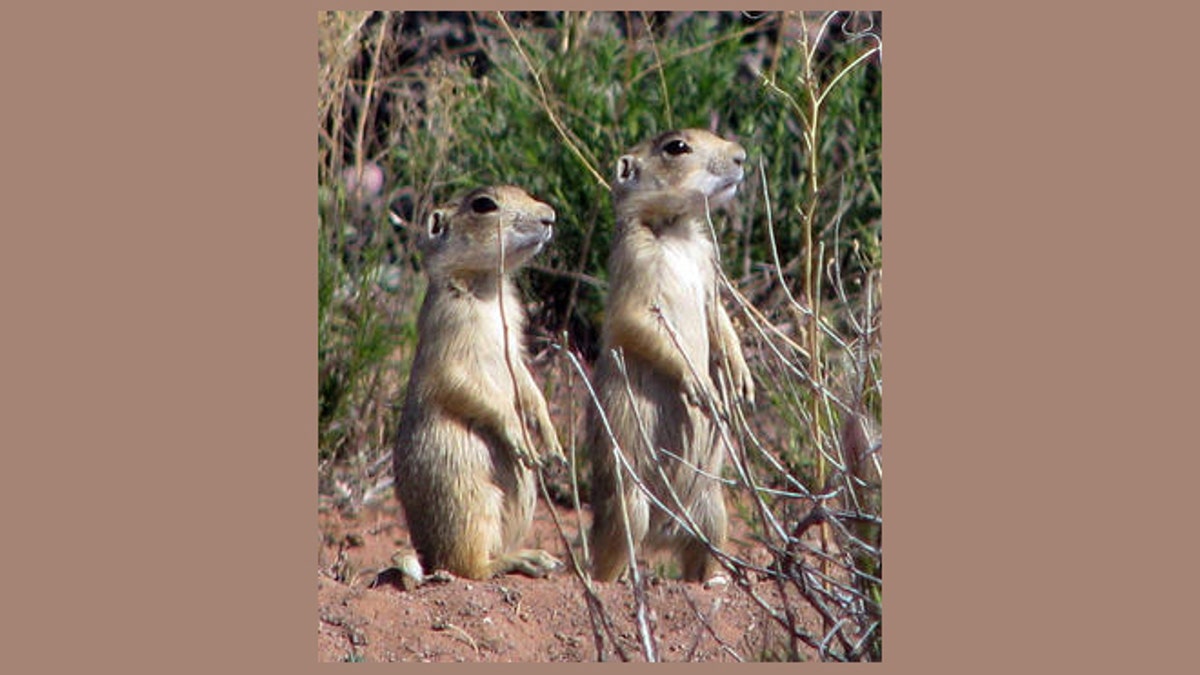
FILE -- Utah prairie dogs (U.S. Fish and Wildlife Service)
PETPO’s victory may be local but it could set in motion a movement to dramatically limit the aggressive actions of the federal government to control private property using the Endangered Species Act.
The increasing use of the Endangered Species Act by the U.S. Fish and Wildlife Service (FWS) places that agency on track to regulate a massive amount of the nation’s land as a habitat for one or more of the listed species and the ones that will be considered in the next few years.
Until now, FWS has been virtually unstoppable in its bid to become land manager of the nation. Recent actions however, have sought to push back on that power play, including a provision in the recent legislation to fund the federal government for 2015 that would prohibit funding for further rules to place sage-grouse on the Endangered Species List. Another attempt comes directly from the local citizens being affected by FWS listings; it is an event that pits man vs. dog.
This story begins with the Utah prairie dog. It lives only in the southwestern corner of Utah, a sparsely populated desert area, a four hour drive from Salt Lake City and consisting mostly of federal lands and two national parks (Zion and Bryce Canyon). The animal is 12 – 14 inches long and weighs up to three pounds. It constantly burrows, leaving parks, backyards, fields, and other public spaces pockmarked with holes and tunnels. There are even tales of it digging in cemeteries during funerals.
PETPO’s victory may be local but it could set in motion a movement to dramatically limit the aggressive actions of the federal government to control private property using the Endangered Species Act.
As an endangered species, its habitat, including areas that it might someday move to, is protected by the FWS, no matter how much it impacts communities. The population is stable, averaging 35,000. As a concession to farmers, FWS allows them to remove 5000 of these animals from agricultural lands for safety reasons. Everyone else must live with these diggers and must manage their property around them, no matter what the cost or impact, including not being able to develop private property.
Tired of having the little amount of private property available for use in Southwest Utah subject to federal regulatory restrictions, a group of citizens organized a coalition called “People for the Ethical Treatment of Property Owners” (“PETPO”) to take on the entire machinery of the federal government that protects the Utah prairie dog so it can continue to destroy their property.
PETPO challenged the constitutional authority of the federal government to protect the Utah prairie dog on private land. It argued that the prairie dog does not substantially affect interstate commerce, which is the only constitutional support for federal regulation of these animals. The government countered that even if the prairie dog has no value and no effect on commerce, it can still be regulated because federal regulation of all species has a substantial effect on commerce. In short, the government argues all regulation is constitutional because the purpose of regulation is to affect commerce.
Most of the time courts give deference to agency decisions, but in this case, the court ruled that the proper constitutional focus must be on the regulated activity not the fact that the government’s regulation impacts commerce. It reasoned that if the regulated activity impacts national markets, the federal government has the power to regulate. But if the regulated activity (in this case the Utah prairie dog) has no impact on national markets, the federal government does not have the power to regulate.
In applying the law to the facts, the court found in favor of PETPO because the Utah prairie dog lives only in southwestern Utah and its diminution would not significantly alter the supply or quantity of animals for which there is a national market.
What is most significant about this case is that the purpose of the Endangered Species Act is to protect ecosystems and on this point the court found that just the protection of an ecosystem may not be sufficient impact on commerce to be constitutional under the commerce clause.
Rather, for the protections under the Act to be constitutional, there must be an impact on interstate commerce. This is a critical finding since 68% of the 1,440 listed species live in only one state and are non-commercial species with no substantial effect on commerce.
PETPO’s victory may be local but it could set in motion a movement to dramatically limit the aggressive actions of the federal government to control private property using the Endangered Species Act. History is replete with small events having big consequences. This story of man vs. dog may be one of those events.








































